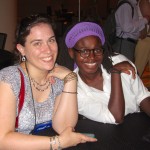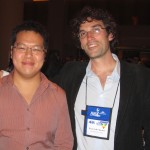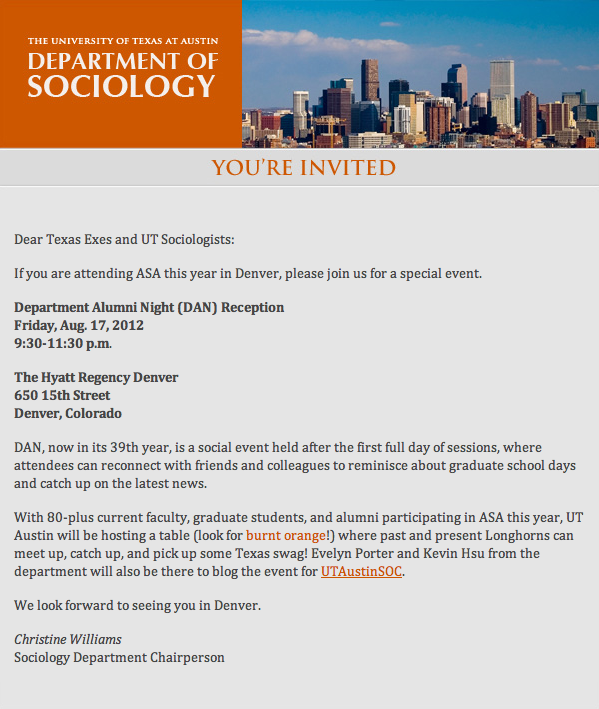By Jessica Sinn, College of Liberal Arts
Published: Aug. 16
 More than 80 professors, students and alumni will showcase their work at the American Sociological Association’s (ASA) annual meeting Aug. 17-20 in Denver, Colorado.
More than 80 professors, students and alumni will showcase their work at the American Sociological Association’s (ASA) annual meeting Aug. 17-20 in Denver, Colorado.
This year’s conference theme, “Real Utopias,” will challenge researchers to explore the viability of utopian ideas and demonstrate how innovative visions can provide alternatives to existing institutions ranging from corporate industries to small communities.
To celebrate the achievement of our sociology scholars, we’re highlighting three up-and-coming researchers who will be presenting at ASA, one of the largest and most important professional gatherings in the field of sociology. For more updates about our student, faculty and alumni presenters at this year’s ASA conference, go to the Department of Sociology’s graduate student blog.
Amy Lodge
 Rank: Graduate Student, Department of Sociology, Population Research Center
Rank: Graduate Student, Department of Sociology, Population Research Center
Research Topic: Parenthood and Physical Activity across the Life Course: How do Gender and Race Matter?
Please give a short description of your research.
My research examines if and how parenthood shapes physical activity (or exercise) and how these patterns differ over the life course by race and gender. In order to examine these questions I analyzed in-depth interviews with 44 African American and white mothers and fathers. These parents represented different life course positions. While some parents were younger and had only very young children, others were older and had only adult child.
What spurred your interest in studying parenthood and exercise?
This research is part of my larger dissertation topic, which examines how various social relationships shape physical activity patterns over the life course differently for men and women and African Americans and whites. From a sociological perspective, social ties-such as the parent-child relationship-are extremely formative in shaping our health behaviors like physical activity. I am interested in physical activity because it is an important component of physical and mental wellbeing. It is one of the best things we can do to improve or maintain our health, yet less than half of Americans engage in regular exercise.
Have you come across any surprising findings in your research?
One surprising finding is that parenthood shapes physical activity very differently over the life course. Parenting duties often limit the amount of time parents – and especially mothers – have for exercise when children are young. Adult children tend to have a more positive impact on parents’ physical activity patterns. Parents of adult children reported that their children motivated them to exercise – either indirectly-they wanted their parents to exercise, to live long and healthy lives, so that they could “be there” for their children–or directly in that they told their parents to exercise.
What is the ultimate goal of your research?
My ultimate goal is to better understand how the social world shapes individual exercise patterns. Specifically I want to understand how different social ties (e.g. intimate relationships, peers, parents, children) shape individual exercise patterns, and if they do so differently for different social groups. Health behaviors, like how much we exercise, are often viewed as arising out of individual will power, responsibility, or even moral worth but that perspective ignores the various ways that the social environment and the people around us encourage or constrain regular exercise. My goal is to better understand these social processes.
What do you hope to accomplish at the American Sociological Association conference?
I hope to learn new things! My previous experiences at ASA have been wonderful because I’ve always left with new ideas and perspectives to incorporate into my own research. ASA is also a great opportunity to receive feedback on your research and to meet students and faculty from sociology departments all over the country.
How has your experience at UT contributed to your success as a student scholar?
There are many ways that UT has contributed to my success as a student scholar, but two ways that immediately come to mind are the wonderful mentorship I have received here as well as the many opportunities for professional development that UT provides. For example, there are several conferences held on campus for graduate students that provide a place to both practice giving conference presentations and receive feedback on your research.
Dara Shifrer
 Rank: Alumna (Ph.D. Sociology, ’11/ MA Sociology, ’08)
Rank: Alumna (Ph.D. Sociology, ’11/ MA Sociology, ’08)
Research Topic: Stigma of a Label: Educational Expectations for High School Students Labeled with a Learning Disability
Please give a short description of your research.
My research takes a sociological approach to learning disabilities (LDs), which means I focus on social factors that are related to youths’ chance of receiving an LD label, as well as social processes related to the LD label that may have implications for youths’ outcomes.
In our studies, we have found that socioeconomically disadvantaged and some linguistic minority high school students are more likely to carry the LD label. Racial minorities who attend lower minority schools are more likely to carry the LD label than otherwise similar racial minorities who attend higher minority schools. A student at a lower poverty school is actually more likely to carry the LD label than an otherwise similar student at a higher poverty school.
These findings suggest that the LD label is not only assigned on the basis of neurological differences, but may also be based on subjective criteria or be a product of social stratification. They also suggest that the LD label is not assigned in a uniform way across schools. I have also found evidence that the LD label is stigmatizing, in that teachers and parents hold lower educational expectations for adolescents labeled with an LD than they do for otherwise similar adolescents not labeled with disability. My findings also show that adolescents who are labeled with an LD may experience poorer educational outcomes at least in part because of this stigma, as well as through placement into lower level courses than their performance and test scores warrant.
What spurred your interest in studying the stigma of a learning disability label?
The federal government is very interested in understanding whether the poorer outcomes of students in special education are a result of their own differences, or whether they are at least partly attributable to the way we process and treat these students within schools.
Despite this interest, there are several misperceptions about the LD label that have resulted in the public and researchers being less likely to perceive the poorer educational outcomes of students labeled with an LD as indicative of stratification and inequity. These misperceptions include the widespread idea that students labeled with an LD are neurologically different, while evidence suggests that the LD label is not based on objective criteria and is not assigned on the basis of uniform standards. People also often perceive youth labeled with an LD as having a low IQ, despite the fact that these students receive the LD label for achievement levels that are lower than would be expected given their (average or high) IQ.
It is the learning potential of youth labeled with an LD that makes it imperative to understand whether our school system contributes to their academic struggles. My personal and professional interactions with people who experience cognitive differences or difficulties have provided my motivation for trying to understand more about the process of labeling and “treating” people.
Have you come across any surprising findings in your research?
One of the most surprising findings to me was the extent to which the LD label arises from and is perpetuated within schools. In other words, the education system has a great deal of authority over which students receive an LD label. LD labels are assigned on the basis of students’ academic achievement and behaviors, qualities that are influenced by a wide range of factors besides neurological differences. Schools also determine what the label will mean for each student, in that some students labeled with an LD continue to access the mainstream curriculum, while others are separated from their peers and important coursework. These school processes are important because schools have so much influence over students’ lives, by determining who receives the preparation to attend college and to attain the occupation of their choice. My evidence suggests that students labeled with an LD experience far more disadvantage within schools compared to their peers who are not labeled with disability, but take similar courses, get similar grades and even score similarly on tests.
What is the ultimate goal of your research?
My ultimate goal is to improve the school and life experiences of students who struggle academically. My findings suggest that we may be able to reduce the incidence of LDs, or the inappropriate labeling of some social groups, by reducing inequities in the wider society, providing more resources to youth with fewer at home, and by improving LD diagnostic procedures. We could improve people’s understanding of LDs and perceptions of these youth through public outreach, teacher training programs and teacher development programs. Attending to the self-perceptions of students labeled with an LD should be an integral aspect of special education programs. Checks and balances could be installed within schools to ensure that the academic progression of students labeled with an LD is not unduly influenced by what their label symbolizes to people.
What do you hope to accomplish at the American Sociological Association conference?
Presenting this research at professional conferences does provide an opportunity to share findings with a wider audience, but more importantly, provides me with a chance to hear fresh perspectives on my work before it is formally published. Presenting research at conferences is one of the many steps toward constructing a study that makes sense to people and is methodologically sound.
How has your experience at UT contributed to your success as a student scholar?
The research opportunities available at UT are outstanding. Most UT faculty are active and successful, and expose their graduate students to high quality research and networking opportunities. I had participated in the non-academic side of these issues as a middle school teacher but it was exciting to discover that there were people who were trying to improve lives in a different way. UT was part of my realization that real change usually happens at the policy level rather than at the individual level, hopefully on the basis of well-conducted research.
Melissa Humphries
Rank: Graduate student, Department of Sociology, Population Research Center
Research Topic: The Political Socialization of Adolescent Children of Immigrants: The Roles of Schooling and Family
Please give a short description of your research.
Our research focuses on the political socialization of adolescent children of immigrants, and how it may differ from their third-plus generation counterparts. We focus on the relationships that family, community and schooling have on the decision to be politically active in young adulthood-specifically looking at whether an individual chooses to register to vote or identify with a political party.
We find that the parental education level of adolescents is not as predictive for many minority children of immigrants compared to white children of native-born parents for registration and voting. Additionally, the academic rigor of the courses taken in high school has a greater positive effect on the likelihood of voter registration, voting and political party identification for Latino children of immigrants compared to white third-plus generation young adults.
What spurred your interest in studying children of immigrants, and the social factors that contribute to their political participation?
Children of immigrants who are U.S. citizens are in a unique position in this country-especially with regard to political processes. They are personally connected to the immigrant community through their parents, but many of their parents may not be able to vote because they aren’t U.S. citizens. These first and second generation youth will be able to voice their opinions at the polls once they turn 18. For this reason, it’s important to explore the process of political socialization for these children of immigrants.
Most research that explores the political socialization of adolescents doesn’t consider the idea that the process may differ among groups, and for the reasons mentioned above, we feel that children of immigrants are an important group to understand.
In general, though, I’m interested in the returns to schooling and how they may differ between different groups-and political participation or civic involvement is one such “return to education.”
Have you come across any surprising findings in your research?
The patterns we found were what we hypothesized. But it is still interesting that the academic pathways that students take in high school seem to have even more of a positive effect on political participation for Latino children of immigrants than third-plus generation white students.
What is the ultimate goal of your research?
Overall, this line of research is aimed at exploring how the schooling process affects the lives of immigrant and children of immigrant students in the United States.
What do you hope to accomplish at the American Sociological Association conference?
I’m looking forward to receiving feedback from others that will help me move forward with this research. It’s always great to be around people who are doing similar research and are thinking about similar problems. I always leave conferences with so many ideas for future research!
How has your experience at UT contributed to your success as a student scholar?
Working with the Population Research Center here at UT has provided me with many opportunities to explore different topics and methods of sociological research. I’ve also been able to get hands-on experience doing thorough research under the guidance of top sociologists. There are so many professors here (including my advisor, Chandra Muller, who is a co-author on this paper) who serve as great examples of how to think about and complete quality, interesting sociological research.














 More than 80 professors, students and alumni will showcase their work at the
More than 80 professors, students and alumni will showcase their work at the  Rank: Graduate Student, Department of Sociology, Population Research Center
Rank: Graduate Student, Department of Sociology, Population Research Center Rank: Alumna (Ph.D. Sociology, ’11/ MA Sociology, ’08)
Rank: Alumna (Ph.D. Sociology, ’11/ MA Sociology, ’08)

